June 28, 2009
'... and when the groove is dead and gone...'
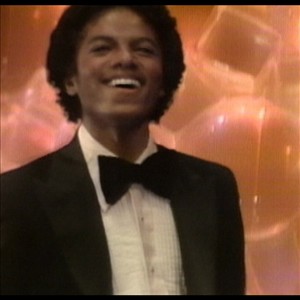 | 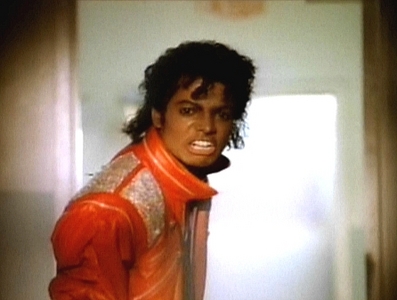 |
What's haunting me, as I watch all the Michael Jackson videos on constant rerun on the music channels, as I listen to the chat of people on benches and in cafes, all of us going through the now well-rehearsed routines of mass-mediated death, but this time, it's not like the consensual narcissism of the Diana faux-mourning, it's shocked grieving for our real royalty, the prince of our deeply mediatized unconscious... what's haunting me is the difference between Jackson in the Off The Wall videos and how he looks in the Thriller clips. I'm not talking about the surgery, or rather I'm not only talking about that. The surgery - by then, 'only' a Disney eye-widening, a Diana Ross nose-narrowing, and a little skin-bleaching, as nothing compared to the collapsing Cronenbergian butchery of later years - is but a symptom of the change that you can see in Jackson's face and body. Something had already disappeared that early, never to return.
The death of this King - "my brother, the Legendary King Of Pop", as Jermaine Jackson described him in his press conference, as if giving Michael his formal title - recalls not the Diana carcrash, but the sad slump of Elvis from catatonic narcosis into the long good night. Perhaps it was only Elvis who managed to insinuate himself into practically every living human being's body and dreams to the same degree that Jackson did, at the microphysical level of enjoyment as well as at the macro-level of spectacular memeplex. Michael Jackson: a figure so subsumed and consumed by the videodrome that it's scarely possible to think of him as an individual human being at all... because he wasn't of course... becoming videoflesh was the price of immortality, and that meant being dead while still alive, and no-one knew that more than Michael...
Greil Marcus's writing on Jackson - or rather 'Jacksonism' - is some of his most astute commentary on pop and political economy. Lipstick Traces was as much about Restoration, about the Spectacular covering over of the punk event of 76-78 as it was about the event itself, and Marcus very quickly understood the massive role that Jacksonism played in this erasure. A new form of control emerged when shopping malls, VHS videos, charity records and TV commercials became interchangable aspects of the same commodity-media landscape: consensual sentimentality as videodrome. Well, it was new then, all that, but it's very old now, and scarcely visible to us any more now that we have grown habituated to living inside it. It was capitalist realism as entertainment, and we all bought to it, whether we liked it or not:
- Thriller enforced its own reality principle; it was there, part of the every commute, a serenade to every errand, a referent to every purchase, a fact of every life. You didn't have to like it, you only had to acknowledge it.
... By 6 July 1984, when the Jacksons played the first show of their "Victory" tour, in Kansas City, Missouri... Jacksonism had produced a system of commodification so complete that whatever and whoever was admitted to it instantly became a new commodity. People were no longer comsuming commodities as such things are conventionally understood (records, videos, posters, books, magazines, key rings, earrings necklaces pins buttons wigs voice-altering devices Pepsis t-shirts underwear hats scarves gloves jackets - and why were there no jeans called Bille Jeans?); they were consuming their own gestures of consumption. That is, they were consuming not a Tayloristic Michael Jackson, or any licensed facsimile, but themselves. Riding a Mobius strip of pure capitalism, that was the transubstantiation.
The fact that the tour was a commercial failure didn't mean anything; it was a probe-head template for the kind of supermanaged cyberspatial PR pseudo-event hypercommodity that has long since become normalised in what we used to call popular culture. Steven Shaviro points out via email - and I know Steven is working on his own MJ post as I type - that, contra the section of Marcus I recently posted here, "the Beatles were every bit as much about marketing as MJ/Thriller was". Of course this is true, but there was a difference in kind between the Thriller hypermarketing and any previous promotional initiative. The Thriller phenomenon was in fact the first taste of the reality system that has just collapsed. "It was ... a version of what Ulrike Meinhof called Konsumterror - the terrorism of consumption, the fear of not being able to get what is on the market, the agony of being last in line: to be part of social life. All over the country, people became afraid of tickets they could not afford to buy, of tickets they might not be able to buy even if they could afford them, of tickets that would seal them as everything or nothing, of tickets that, as the humiliating, exciting process began, were not even on sale." (Marcus) "An economist from the Motown era time-travelling to present-day Detroit would be faced with a puzzle," Paul Mason writes in Meltdown. "If wages have fallen, then who's buying all the burgers, training shoes, six-packs, televisions and hair extensions that keep this army of low-paid people at work on six to nine dollars an hour? Heny Ford said you couldn't have mass consumption without high wages, so where is the money coming from? The answer is credit: credit cards, shor-term 'payday' loans, zero-percent car finance, low interest rates and self-certified mortgages."
"The Motown sound," Mason argues in Meltdown , "seemed to sum up the deal Henry Ford's system offered the working class: hard work, frenetic leisure and a counter-culture that made everything else look uncool. Above all, it was a world of rising real income. If you work eight hours a day on a production line that does not stop, these three words - 'rising real income' - represent the most important single fact in economics." Up to and including Off The Wall, Michael Jackson's music belonged to that old black dream - music as leisure-convalescence, a utopianism confined to time off work ("gonna leave that 9 to 5 up on the shelf"), with the fortunate few, like Jackson, elevated into superstardom and then - like he and his brothers in the video for the awesome "Can You Feel It" - sprinkling a little stardust on the hardworking black population below.
Off The Wall is still in the grip of Saturday night fever, delirious with all the summer-sweet promise of disco. Here, Quincy Jones and Jackson constructed a song suite that did for late 70s black dance culture what Scott Fitzgerald's novels and stories had done for an earlier, whiter, richer American moment: they shaped the fragile evanescences of youth and dance into beautiful myths, laced with fabulous longings that they could neither contain or exhaust.
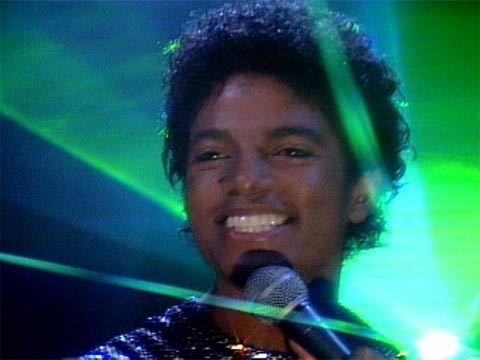
The tracks on Off The Wall have an easy disco swagger, which Michael embodies in his dance steps and his grin. The smile may well have been forced, but it doesn't look as if it was. Jackson was at least capable of convincingly simulating (en)joy(ment) at this point. Off The Wall, accordingly, is his masterpiece, the LP-pinnacle of disco, disco as theology, the songs secular hymns to divine disco itself, the impersonal 'force', the inhuman drive, that makes life living but has nothing to do with the vital. Jackson would make better tracks - or one better track, of which more shortly - but none of the LPs, including the largely anodyne Thriller, get even close to Off The Wall. It's a seducer's diary, sung by someone who has himself been ravished, who has given up everything for dance.
"Don't Stop Till You Get Enough" practically leads you by the hand to the dancefloor, the milky-way swirl of the strings sweeping you up, the deliquescing delight ("I'm melting") of Michael's enraptured falsetto gently undoing any resistant character armour. It's a love song to dance itself, just like "Rock With You", which similarly sees the whole universe in a disco mirrorball. "Rock With You" manages the amazing feat of simultaneously bring a tear to the eye and a shuffle to your feet. Jackson comes on as benevolent disco-svengali so he can seduce the listener-girl that the song turns us all into: "Girl, close your eyes/ Let That rhythm get into you/ don't try to fight it" - and who would want to fight it? Listen to the way that the synths and strings suggest starlight seen by starstruck lover's eyes. Is there any record which better captures the cosmic vertigo of falling in love than "Rock With You"? That headlong synaesthetic rush in which music, dancing and love feed each other in a reflexive virtuous circle which, even though it seems miraculous, unbelievable, ("girl, when you dance/ there's a magic that must be love"), at the same time seems like it couldn't possibly end ("And when the groove is dead and gone/ you know that love survives/ and we can rock forever"- ? This was Soul to sell your soul for. No wonder that Green Gartside sacrificed the whole of his avant-garde self in order to sound like this. And if you asked me to choose between Off The Wall and the entire back catalogue of the Sex Pistols and the Beatles, there would be no contest. I respectThe Beatles and the Pistols, but they had already calcified into newsreel-heritage before I even took heed of them; whereas Off The Wall is still vivid, irresistible, sumptuous, teeming with technicolour detail.
Something disappeared after this. It isn't only that Jackson was still a young black man then - and a sexually alluring young black man, with twinkling desire-drunk eyes - rather than the repellent whitened sepulchre he would become a decade later... Think of the creepy video for "The Way You Make Me Feel", Jackson stalking a woman (who by this point it is impossible to believe he would ever want) down a late-night street, looking both sexually aggressive - his disintegrating face now permanently contorted into that pierrot grimace-sneer - and sexually neuter, as if the increasingly absurd performance of peacock-posturing intimidation substitutes for any actual sexual desire. It isn't only that he has not yet become deracinated or desexualised, for deracination and desexualisation might precisely have been refusals of the Restoration's compulsory ethnicity and sexuality, and Jackson could have been a poster boy for queer universality... if his dysphoria, his freakishness, could have found its way into the music. Instead, it was Gothic Oedipus in his (very public) private life dramas, and consensual sentimentality in the saccharine-bland songs. Only in "Scream" and its video - Michael and Janet in a deserted offworld leisure hive that resembles Gibson's incest-Xanadu Villa Straylight - did the music and the crumbling mind ever meet.
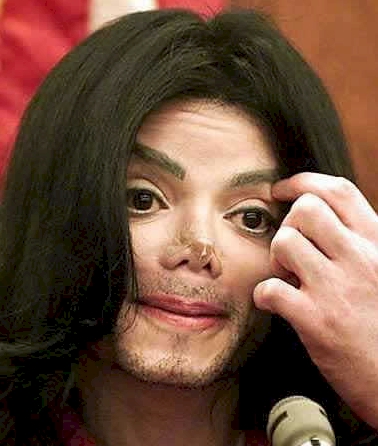
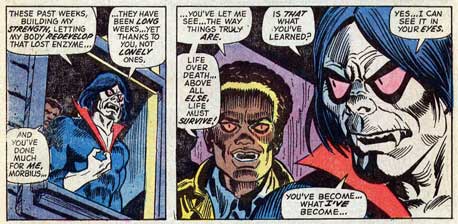
But before the Thriller phenomenon encased Jackson in the hypercommodity that he was now reduced to being just a little part of - he would soon be only a biotic component going mad in the middle of a vast multimedia megamachine that bore his name - but before all that was "Billie Jean". "Billie Jean" is not only one of the best singles ever recorded, it is one of the greatest art works of the twentieth century, a multi-levelled sound sculpture whose slinky, synthetic-panther sheen still yields up previously unnoticed details and nuance nearly thirty years on. The only remote parallel I can think of in 80s pop is the sonic architecture that Arif Mardin designed for Chaka Chan on "I Feel For You".
Sometimes, the weariness brought on by hearing it so many times will make you twitch the dial when "Billie Jean" comes on the radio. But let it play, and you're soon bewitched by its drama, seduced into its sonic fictional space, the mean streets and chilly single-parent single-room appartments that now suround the still-glittering dancefloor like conspiring fate. Listening is like stepping onto a conveyor belt. And that's what it sounds like, as the implacable, undulating sinous cakewalk of the synthetic bass takes over the massive space opened up by the crunching snares Jones and Jackson insouciantly hijacked from hiphop. Check, if you can manage to keep focused as the track crawls up your spine and down to your feet, embodying the very compulsion the lyric warns against... check the way that the first sounds you hear from Jackson are not words but inhuman asignifying hiccups and yelps, as if he is gasping for air, or learning to speak English again after some aphasic episode.
Ten years after psychedelic Soul, this is cyborg Soul, with Jackson as cut-up as Grace Jones ever was - partly by the (James) Brownian motion of his own language-disassembling vocal tics (the mirthless, and indeed emotionally unitelligible, joker-hysterical hee-hees, the ooohs shotgun-divorced from doo-wop's street corner community to circulate like disembodied wraithes in the survivalist badlands of an inner city ravaged by Reaganomics), partly by the astonishing arrangement. Check the way that the first string-stabs shadow the track like stalker's footsteps, disappearing into the cold wind like mist and rumour. Feel the tension building in your teeth as the bridge hurtles towards the chorus, begging for a release ("the smell of sweet perfume/ this happened much too soon) that you know will only end in regret, recrimination and humiliation, but which you can't help but want any way, desire so intense it threatens to fragment the psyche, or expose the way that the psyche is always-already split into antagonistic agencies: "just remember to always think twice". Does he then sing "do think twice" or, in an id-exclamation that echoes like a metallic shout in an alley of the mind, "don't think twice"? Everything dissolves into audio-hallucination, the chronology gets confused, the noir string-slivers shiver. Jackson is angry at his accuser (and also at the fans who will trap him into the Image: Billie Jean is pop's Misery) but also weirdly mournful, hunted, pleading (to the big Other, in kettle logic: I didn't do it, I couldn't help it), the part-objects of his voice circling a psyche without a centre. Notice that it's a song about the very things Marcus talks about in Lipstick Traces: seduction by Spectacle, about the way in which everyday life is taunted and haunted by the screen ("she was more like a beauty queen/ from a movie scene"). Billie Jean - which was effortlessly modern, a new Soul that was devoid of any hint of pastiche - could still dramatise all this; perhaps what you can hear is the very process of subsumption itself, Jackson becoming the brand. After this, there would be few glimmers of any outside.
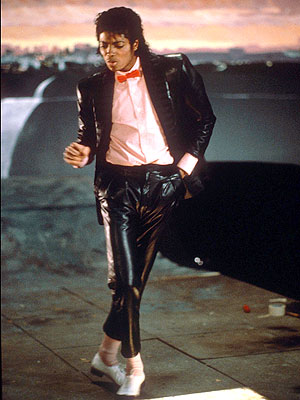
But what had been lost? The Situationist theory that Marcus draws on in Lipstick Traces is informed by a cryto-Bergsonism, a sense that reification consists in the encrustation and calcification of the living body. But what if it weren't a case of the organic being subsumed by the inorganic, but one inorganic being replaced by another? Dancing is always about the death drive, about the libidinal disciplining of the body, about forcing the body into unnatural postures and shapes (when Jackson occasionally amazes after "Billie Jean", it is more likely to be because of his dancing than his singing - the impossible-looking anti-gravity of his literalisation of the gangster lean in the "Smooth Criminal" video for instance). "Every artist," Nietzsche writes in Beyond Good And Evil
- knows how far from the feeling of letting himself go his “most natural” condition is, the free ordering, setting, disposing, shaping in moments of “inspiration”—and how strictly and subtly he obeys at that very moment the thousand-fold laws which make fun of all conceptual formulations precisely because of their hardness and decisiveness (even the firmest idea, by comparison, contains something fluctuating, multiple, ambiguous—).
Dancing is precisely a question of subordinating the body to "arbitrary laws" - and eventually, after the punishing dedication that Jackson put in, that subordination yields an inspiration that grips and micro-directs the body. A different model of freedom emerges here to the neoliberal one, which centres on the "choice" that Jackson promoted when he turned "Billie Jean" into a commercial for Pepsi. Singing about choice, performing in a dead live show: "a stiff, impersonal, over-rehearsed supper club act blown up with lasers and sonic booms....[And how many entertainment 'spectaculars' of the last twenty years does that sum up?] Michael Jackson, who began this year as a dancer, turned into a piece of wood." (Marcus) But what if he had stayed a dancer? What if his moves could have been extricated from that supper-club spectacle? What if the young black man in those Off The Wall videos had not disappeared?
Posted by mark at June 28, 2009 01:35 AM | TrackBack